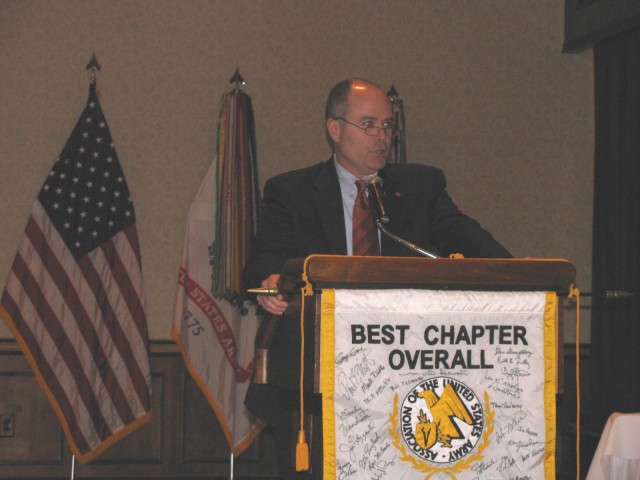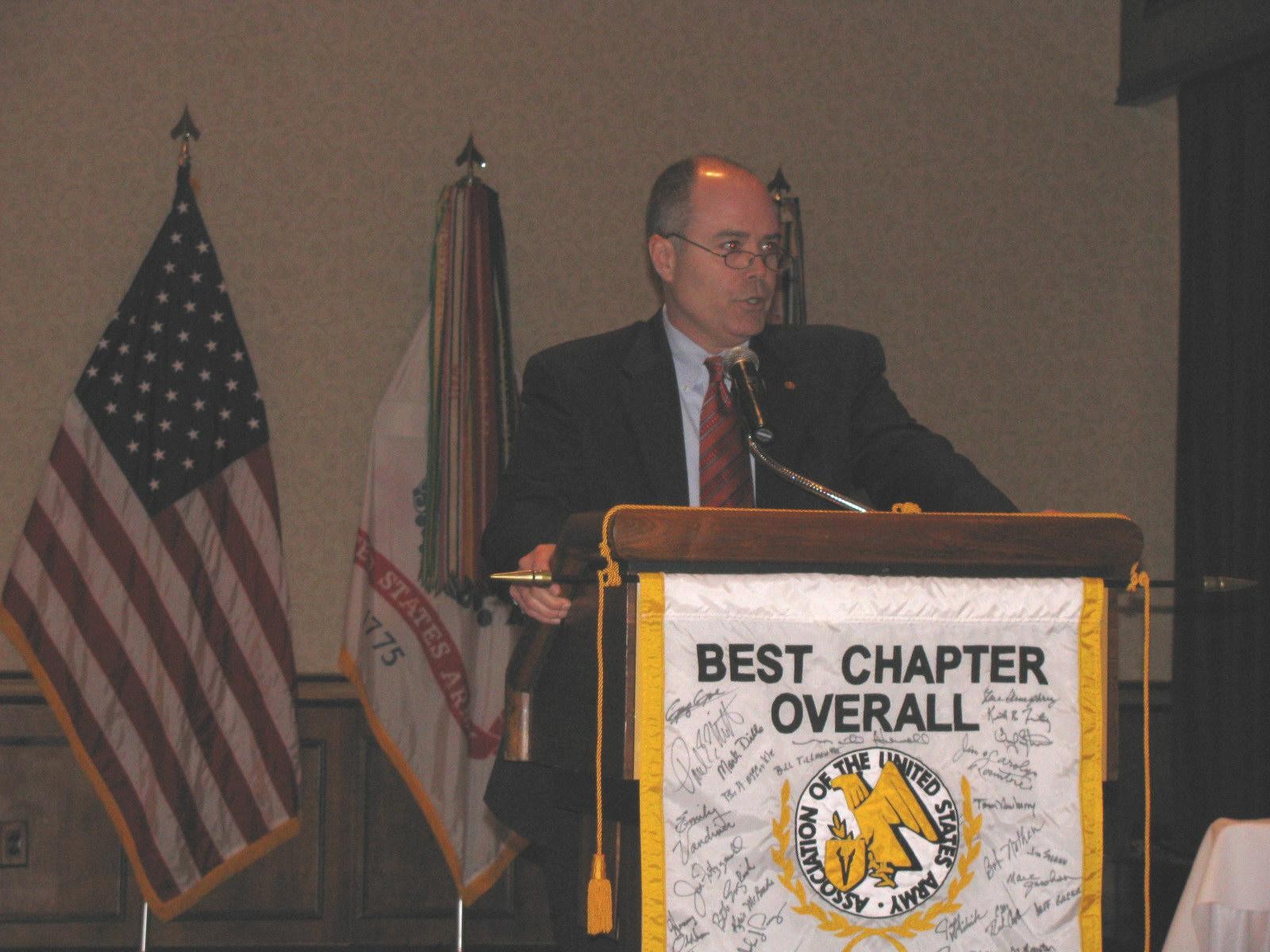
Even in the wake of expected future cuts in military spending, the U.S. needs to ensure enough funding to sustain its missile technology and development, said a top official with the Program Executive Office for Missiles and Space.
Rod Summers, deputy PEO for integration, said the organization's top executives led by Brig. Gen. Genaro Dellarocco are working to tell the story of missile defense at the Pentagon to try to ensure against future budget cuts that could cripple the nation's missile defense industry. He made his comments during a speech Friday to members of the Redstone-Huntsville Chapter of the Association of the U.S. Army at a Bosses' Breakfast at the Officers and Civilians Club.
The story of missile defense includes missile systems such as Hellfire, Sentinel, TOW, Javelin, Avenger, Stinger, Patriot and HIMARS, and the engineers and technicians who manage them.
"We are really telling the story of missile defense. There is going to be declining money available and we want them to know the effect that could have on us as a missile community," Summers said.
"The Army is really the sole provider of weapons in that class of missiles ... In industry, to maintain design teams and keep creative people in place you have to give them challenges. Creative engineers and specialists are vital to the missile industry. You understand that building a missile is an art. The apprentice-mentor relationship in missile development is handed down through the years. Generation to generation understand how to build missiles, how to put them together and where the problems are."
If funding doesn't allow that generational relationship to continue, then the U.S. will lose its missile development capability.
"If you skip a generation, then you have to start all over again," Summers said. "It's a national issue. If you lose the ability to build missiles then it can take 10 to 15 years to gain that back. People outside the missile community don't appreciate that."
Budget concerns along with the protocol for getting requirements to the execute level for funding threaten the future health of the missile industry. Summers said some problems due to tighter budgets have already been noticed.
"We are carrying the message," Summers said. "The missile industrial base is extremely important to our country. We cannot let that decline. It is extremely important to our future."
Summers went on to say that PEO for Missiles and Space is also facing the challenges of BRAC moves to Redstone Arsenal as Army organizations work to fill new jobs at Redstone Arsenal with qualified employees.
"The flow of personnel is running a little behind what we expected," Summers said. "There will be a huge domino effect once all this (the BRAC moves) starts taking place. The number of people coming here is steadily on the decline ... We will have to manage that particular problem. There will be no shortage of jobs. We just need to work to fill them with the right people."
PEO for Missiles and Space is organized along customer lines. Under integration, Summers is responsible for the management of NLOS-LS (Non-Line of Sight Launch System), IAMD (Integrated Air and Missile Defense), CMDS (Cruise Missile Defense Systems) and LTPO (Lower Tier Project Office).
Overall, PEO for Missiles and Space has a current budget of $3.5 billion and expects a fiscal '09 budget of $3.843 billion. But, as military budgets decrease, the organization will come to rely more on international sales of missile systems, Summers said.
"We have over $12 billion in international sales in just the fiscal year of '09," he said. "Because of the depth and breadth of international sales, it will cause us to look at some organizational changes and the way we work with customers."
Foreign military sales brings the fiscal '09 budget at PEO for Missiles and Space to more than $16 billion, not including the organization's work with THAAD. As foreign military sales grow, they will continue to have a significant impact on PEO for Missiles and Space and will lead to additional improvements in missile system capabilities.
"International sales are a big challenge for us," Summers said. "It's great news for all of us that we can have the kind of sales that we're seeing. We need to make sure we serve our international partners in the way they need to be served."
In recent meetings with employees, Summers said it was obvious there is a growing concern over what the new administration will do in terms of budget cuts for missile systems.
"Without fail, employees asked 'What's going to happen with the new administration' How is it going to affect us''" he said.
"The response has been 'Change is going to happen. We've heard the rumors of big ticket programs being cut ... We'll see some termination of programs. We're preparing ourselves. But we don't know what will happen. We are fighting for our programs.'"
Budget funds for fiscal '10 won't be announced until end of March or April, and there could be some reshaping of programs in that budget. But, Summers doesn't expect major changes in program funding to happen until the fiscal 2011 through 2015 budgets.
"We don't know what's going to change. There are a lot of speculations as to what's going to happen," he said. "I don't think we will start to see sweeping changes from this administration until this summer."
Summers said Army programs that deliver beyond military systems will continue through budget cuts.
"Programs have to have a means of developing capability. Not just systems, but capability," he said. "In our PEO organization, we've been delivering capability for 30 years. We're familiar with what's coming and we think we'll be postured for that change. We're looking at our organization to see how we make our PEO an integrated PEO. We're delivering capability to the Soldier. We're not forcing the Soldier to integrate things for themselves."
In closing the meeting, local AUSA president Mike Howell told the organization's corporate members that it will continue to need a lot of support for programs in 2009.
"There are a lot of big things happening this year," he said. "We're going to be asking for support. We know things are tight, but we're asking for your support."
Among the organization's 2009 activities, Howell mentioned hosting the 3rd Region AUSA session in April and the annual Salute Dinner during Armed Forces Week in the summer. The organization hopes to have Army Materiel Command commander Gen. Ann Dunwoody as the speaker at the 3rd Region meeting and Gen. David Petraeus, commander of the U.S. Central Command and former commander of Multi-National Force-Iraq, as the speaker at the Salute Dinner.
"Great things are coming up," he said.
In addition, during the breakfast the chapter presented retired Brig. Gen. Bob Drolet, AUSA 3rd Region executive vice president and AUSA state president, with a citation "for exceptional service in support of national defense."

Social Sharing